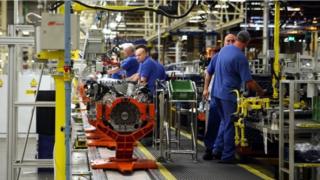'Post-Ford Bridgend' plan needed, says small firms body
 Image copyright
PA
Image copyright
PA
Business leaders and politicians must work together to understand what a "post-Ford Bridgend looks like", the Federation of Small Businesses (FSB) has said.
On Thursday the car manufacturer announced that it intended to shut its site in the town in September 2020.
The First Minister Mark Drakeford is expected to meet unions on Friday to discuss the future for the site.
Around 1,700 people work at the factory, which opened in 1980.
The company put the decision down to "changing customer demand and cost".
FSB Wales' head of external affairs Ben Cottam said Ford had been "in the economic landscape for forty years".
"Around that has grown up a small business supply chain so we know that this is going to cause some real concern among smaller businesses.
Timeline to closure
2008: Ford announces it will operate as a single global company - meaning its Bridgend engine plant had to compete with the firm's other factories across the world, not just in Europe
2015: Bridgend secures investment for Dragon petrol engine project - with 250,000 engines a year, although it has capacity for 750,000 a year
2016: The planned Dragon investment is reduced to £121m and the number of engines is cut in half to 125,000
2017: Ford projects a reduction of 1,160 workers by 2021 and confirms production of Jaguar Land Rover engines - which involves half the workforce - will end in 2020
2018: Workers making Jaguar engines face a five-day shutdown as a knock-on effect from JLR's temporary production halt. Ford's European boss warns a no-deal Brexit would be "pretty disastrous"
Jan 2019: Ford plans to cut 370 jobs the first phase of redundancies which will total 990 by 2021. The Dragon project was scheduled to employ about 500
June 2019: Ford announces it plans to close the plant in September 2020 citing three reasons - the phasing out of one engine model, the end of Jaguar Landrover contract and a decline in the demand for the new 3-cylinder engine
Economy minister Ken Skates said on Thursday he was "absolutely livid" at Ford's decision to "turn their back on Bridgend".
Mr Skates told Gareth Lewis on BBC Radio Wales that he was working with the chemicals company Ineos and others "who would like to come to this area".
Mr Cottam said: "What we need to do now is identify those businesses, understand how they're affected and I think we want to see support from government, both in Cardiff Bay and in Westminster to support them to diversify, to re-skill and to look for new opportunities.
"We need to understand what a post-Ford Bridgend looks like.
"This is a town and a region that has really depended on the presence of a very large employer so we need to look at how we diversify that economy and create new opportunities."
In numbers
1,700workers
£3.3bnvalue to Welsh economy over 10 years
£140mWelsh Government support
£45,000average annual salary
Mr Cottam welcomed the Welsh Government's decision to set up a rapid response taskforce and called on ministers in Cardiff and Westminster to work together.
"We want to see determination from both Welsh Government and UK Government to work together with all the partners involved, get around the table, understand what is immediately needed, understand what the future in the longer-term is for Bridgend and the wider region and come up with some tangible actions to help remediate this."
Electric vehicles
Welsh Secretary Alun Cairns told Gareth Lewis on BBC Radio Wales on Thursday the UK government and Welsh Government "have already been working on potential investors" but "clearly there is a lot more work".
Mr Cairns also said he has been in touch with Mr Skates about exploring the production of electric vehicles as a means of protecting jobs in the Bridgend area.